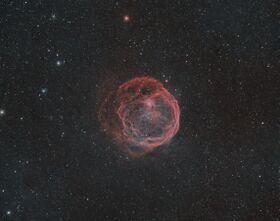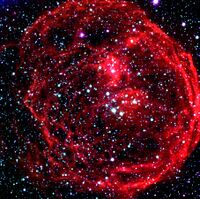Astronomy:Henize 70
| Emission nebula | |
|---|---|
| Superbubble | |
 Amateur photograph of Henize 70 Credit: Dylan O’Donnell | |
| Observation data: J2000 epoch | |
| Right ascension | 05h 43m 17.5s[1] |
| Declination | −67° 50′ 48″[1] |
| Distance | ~50,000[2] pc |
| Apparent dimensions (V) | 7′ × 8′[3] |
| Constellation | Dorado |
| Physical characteristics | |
| Dimensions | 346 × 396[4][lower-alpha 1] |
| Notable features | Superbubble |
| Designations | Henize 70,[5] N70,[3] LHA 120-N 70,[3][6] DEM L 301, MCELS L-373[6] |
Henize 70 (N70) is a faint[7] emission nebula[8] and superbubble[5][4][9][10] located in the Large Magellanic Cloud. It is located in the constellation of Dorado.
Observation history
Henize 70 was first observed in 1950 in a survey of bright planetary nebulae, based on appearance it was proposed that it might be a supernova remnant.[7] In 1956, it was added to a catalogue of Hα emission stars and nebulae by Karl Gordon Henize, where it was described as an emission nebula instead of a planetary nebula.[8]
Origins

In a paper published in 1978, it was proposed that stellar winds could be a major part of the formation of Henize 70 and other emission nebulae.[11] Later, in a scientific article 1981 it was mentioned that it was more likely from a supernova explosion rather than stellar winds.[12] Another study in 2014 measured high SII and Hα ratios, indicating that it is not a supernova remnant.[13]
Henize 70 has spectral line ratios relatively similar to that of supernova remnants due to having similar SII/Hα line ratios although most supernova remnants have higher NII/Hα line ratios.[14]
Notes
- ↑ Using angular dimensions of 7’ × 8’ and a distance of ~170 kly.
[math]\displaystyle{ d \times \sin{\theta} }[/math]
References
- ↑ 1.0 1.1 Pellegrini, E. W.; Oey, M. S.; Winkler, P. F.; Points, S. D.; Smith, R. C.; Jaskot, A. E.; Zastrow, J. (13 February 2012). "The Optical Depth of H II Regions in the Magellanic Clouds". The Astrophysical Journal 755 (1): 30. doi:10.1088/0004-637X/755/1/40. ISSN 0004-637X. Bibcode: 2012ApJ...755...40P.
- ↑ Schneiter, E. M.; Reyes-Iturbide, J.; Velàzquez, P. F.; Esquivel, A. (2 February 2022). "X-ray and optical emission from large superbubbles including the stellar photoionization". Monthly Notices of the Royal Astronomical Society 511 (3): 3420–3427. doi:10.1093/mnras/stac292. ISSN 1365-2966. Bibcode: 2022MNRAS.511.3420S. https://academic.oup.com/mnras/article/511/3/3420/6520454.
- ↑ 3.0 3.1 3.2 Davies, R. D.; Elliott, K. H.; Meaburn, J. (1976). "The nebular complexes of the Large and Small Magellanic Clouds". Memoirs of the Royal Astronomical Society 81: 89. Bibcode: 1976MmRAS..81...89D. https://ui.adsabs.harvard.edu/abs/1976MmRAS..81...89D/abstract.
- ↑ 4.0 4.1 "N70. Henize 70". https://astrodrudis.com/n70-henize-70.
- ↑ 5.0 5.1 "Henize 70: A SuperBubble In The LMC". Astronomy Picture of the Day. https://apod.nasa.gov/apod/ap991130.html.
- ↑ 6.0 6.1 "LHA 120-N 70". SIMBAD. Centre de données astronomiques de Strasbourg. http://simbad.u-strasbg.fr/simbad/sim-basic?Ident=LHA+120-N+70.
- ↑ 7.0 7.1 Evans, D. S.; Thackeray, A. D. (1950). "A photographic survey of bright southern planetary nebulae". Monthly Notices of the Royal Astronomical Society 110 (5): 429–439. doi:10.1093/mnras/110.5.429. ISSN 1365-2966. Bibcode: 1950MNRAS.110..429E. https://academic.oup.com/mnras/article/110/5/429/2603588.
- ↑ 8.0 8.1 Henize, Karl G. (September 1956). "Catalogues of Hα-emission Stars and Nebulae in the Magellanic Clouds.". Astrophysical Journal Supplement 2: 315. doi:10.1086/190025. ISSN 0067-0049. Bibcode: 1956ApJS....2..315H. https://ui.adsabs.harvard.edu/abs/1956ApJS....2..315H/abstract.
- ↑ "N70 Nebula in the Large Magellanic Cloud". European Southern Observatory. 14 April 2023. https://www.eso.org/public/images/eso9948d/.
- ↑ "Henize 70: A Superbubble in the LMC". NASA. 14 April 2023. https://science.nasa.gov/henize-70-superbubble-lmc.
- ↑ Meaburn, J. (November 1978). "H I, Molecular/H II Shells from 1 to 2000 pc Diameter: Wind-Driven or Supernova Remnants?". Astrophysics and Space Science 59 (1): 193–214. doi:10.1007/BF00651050. ISSN 1572-946X. Bibcode: 1978Ap&SS..59..193M. https://link.springer.com/article/10.1007/BF00651050.
- ↑ Rosado, M.; Georgelin, Y. P.; Georgelin, Y. M.; Laval, A.; Monnet, G. (April 1981). "Kinematics of ring-shaped nebulae in the LMC. I - The radial velocity field of N70". Astronomy and Astrophysics 97 (2): 342–346. ISSN 0004-6361. Bibcode: 1981A&A....97..342R. https://ui.adsabs.harvard.edu/abs/1981A%26A....97..342R/abstract.
- ↑ Zhang, Ning-Xiao; Chu, You-Hua; Williams, R. M.; Jiang, Bing; Chen, Yang; Gruendl, R. A. (24 July 2014). "Physical Nature of the [S II]-bright Shell Nebulae N70 and N185". The Astrophysical Journal 792 (1): 9. doi:10.1088/0004-637X/792/1/58. ISSN 0004-637X. Bibcode: 2014ApJ...792...58Z.
- ↑ Skelton, Brooke P.; Waller, William H.; Gelderman, Richard F.; Brown, Larry; Woodgate, Bruce; Caulet, Adeline; Schommer, Robert A. (27 February 1999). "Emission-Line Properties of the Large Magellanic Cloud Bubble N70". The Publications of the Astronomical Society of the Pacific 111 (758): 465-481. doi:10.1086/316346. ISSN 1538-3873. Bibcode: 1999PASP..111..465S. https://iopscience.iop.org/article/10.1086/316346.
 |

